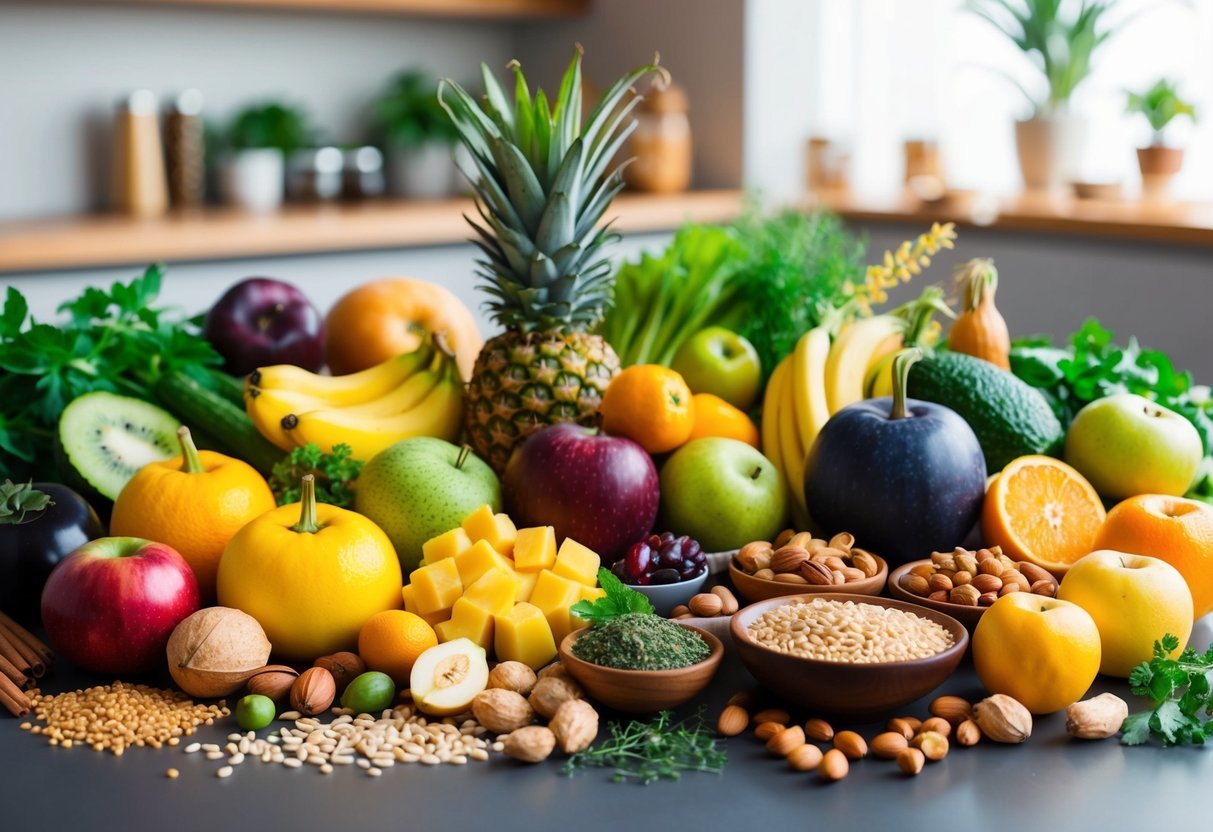Understanding Anti-Inflammatory Foods
Anti-inflammatory foods can significantly manage inflammation and promote overall health.
By choosing the right foods, you can help reduce chronic inflammation and improve your well-being.
Defining Anti-Inflammatory Diets
An anti-inflammatory diet focuses on foods that may help decrease inflammation in the body.
This type of diet typically includes a variety of fruits, vegetables, whole grains, healthy fats, and lean proteins.
Key components include:
- Fruits and Vegetables: Berries, leafy greens, and citrus fruits are especially beneficial.
- Whole Grains: Oats, brown rice, and quinoa provide fiber that can reduce inflammation.
- Healthy Fats: Olive oil and fatty fish like salmon are rich in omega-3 fatty acids.
- Lean Proteins: Skinless poultry and legumes offer protein without inflammatory effects often seen in red meats.
By focusing on these foods, you can create a balanced diet that supports your health.
Role of Nutrition in Inflammation
Nutrition plays a crucial role in how your body responds to inflammation.
Consuming the right foods can either help combat or contribute to inflammation.
Certain nutrients and compounds have specific effects:
- Antioxidants: Found in colorful fruits and vegetables, they protect your cells from damage.
- Fiber: A diet high in fiber has been linked to lower levels of inflammatory markers.
- Omega-3 Fatty Acids: These help inhibit the production of molecules that promote inflammation.
Conversely, diets high in processed foods, sugar, and unhealthy fats can increase inflammation.
Understanding how nutrition affects your body can empower you to make better dietary choices.
Key Components of an Anti-Inflammatory Diet
A well-rounded anti-inflammatory diet includes a variety of fresh foods that help reduce inflammation in the body.
By focusing on whole foods like fruits, vegetables, healthy fats, proteins, and specific beverages, you can create meals that promote health and well-being.
Fruits and Vegetables
Fruits and vegetables are packed with vitamins, minerals, and antioxidants.
They play a vital role in fighting inflammation.
Aim for a colorful variety, including berries, oranges, spinach, and broccoli.
- Berries are rich in antioxidants called polyphenols, which help combat oxidative stress.
- Leafy greens like spinach and kale provide fiber and essential nutrients.
Aim for at least five servings of fruits and vegetables each day to fully benefit from their anti-inflammatory properties.
Healthy Fats and Oils
Incorporate healthy fats into your diet for their anti-inflammatory effects.
Olive oil is a key player here.
It contains oleocanthal, which has similar properties to non-steroidal anti-inflammatory drugs.
- Nuts and seeds, such as almonds and chia seeds, are also great sources of omega-3 fatty acids.
- Avocados are another excellent option, providing both healthy fats and vitamins.
Using these fats in moderation can help lower inflammation and improve heart health.
Whole Grains and Proteins
Whole grains like brown rice, quinoa, and whole-wheat bread are high in fiber.
Fiber is important for gut health and can reduce inflammation.
Lean protein sources, including fish, poultry, and plant-based options like beans and legumes, should also be included.
- Fatty fish such as salmon and mackerel are particularly beneficial due to their high omega-3 content.
- Legumes provide plant-based protein along with fiber, promoting satiety and reducing inflammation.
Choosing these whole foods supports overall health.
Herbs, Spices, and Fermented Foods
Incorporate herbs and spices to add flavor and health benefits.
Turmeric and ginger are particularly noted for their anti-inflammatory properties.
- Turmeric contains curcumin, which has been shown to reduce inflammation in the body.
- Ginger can also help decrease soreness and swelling.
Fermented foods like yogurt, sauerkraut, and kimchi contain probiotics.
These friendly bacteria improve gut health and support your immune system.
Including these foods can help maintain a healthy balance in your gut.
Anti-Inflammatory Beverages
What you drink matters too.
Certain beverages can have strong anti-inflammatory effects.
- Green tea is rich in polyphenols, providing antioxidant benefits.
- Coffee can also have anti-inflammatory effects when consumed in moderation.
Adding these drinks to your daily routine can enhance your overall diet and support your health goals.
Specific Foods to Include in Your Diet
Eating the right foods can help reduce inflammation in your body.
Focus on including a variety of colorful fruits, vegetables, healthy fats, and protein sources in your diet.
This section highlights specific foods that can support your inflammatory response.
Leafy Greens and Cruciferous Vegetables
Leafy greens like spinach, kale, and Swiss chard are excellent choices.
They are rich in vitamins A, C, and E, which help fight inflammation.
Cruciferous vegetables such as broccoli and cauliflower are packed with antioxidants.
Broccoli, for instance, contains sulforaphane, known for its anti-inflammatory properties.
You can easily add these to salads, smoothies, or stir-fries.
Aim to fill half your plate with these vegetables at meals to maximize their benefits.
Brightly Colored Berries and Fruits
Berries, especially blueberries and cherries, are high in antioxidants like anthocyanins.
These compounds can help lower markers of inflammation in the body.
Apples are another great option, as they contain quercetin, which has anti-inflammatory effects.
Incorporate these fruits into your daily routine by adding them to yogurt, smoothies, or oatmeal.
Aim for a variety of colors to ensure a wide range of nutrients.
Nutrient-Dense Nuts and Seeds
Nuts and seeds provide healthy fats and protein, making them nutrient-dense snacks.
Almonds and walnuts are particularly beneficial due to their high vitamin E and omega-3 fatty acid content.
Chia seeds are also an excellent source of omega-3s and fiber.
You can sprinkle nuts and seeds onto salads or oatmeal for added crunch and nutrition.
A handful a day can contribute to better heart health and reduced inflammation.
Fatty Fish and Lean Meat Options
Fatty fish like salmon, mackerel, and sardines are rich in omega-3 fatty acids, which are critical for reducing inflammation.
These fish also provide high-quality protein.
If you prefer lean meat, consider skinless chicken or turkey as healthy options without excess saturated fat.
Aim for at least two servings of fatty fish each week.
Grilling or baking these proteins can help retain their nutrients while keeping meals healthy.
Legumes and Pulses
Legumes, such as beans, lentils, and chickpeas, are excellent plant-based protein sources that also contain fiber and antioxidants.
They help stabilize blood sugar levels and improve gut health.
Black beans and kidney beans have unique compounds that provide additional anti-inflammatory benefits.
Incorporate legumes into soups, salads, or as a main dish to add texture and nutrients.
Aiming for several servings a week can significantly boost your overall health.
Foods to Limit or Avoid

To manage inflammation, it’s important to limit certain foods that can trigger or worsen inflammatory responses in your body.
The following sections detail specific categories of foods to avoid.
Processed Meats and High-Fat Dairy
Processed meats, such as bacon, sausages, and deli meats, often contain preservatives and high levels of saturated fat.
These ingredients can lead to increased inflammation in your body.
High-fat dairy products like cream, full-fat cheese, and butter can also contribute to inflammation due to their saturated fat content.
Instead of these options, consider lean proteins like chicken or plant-based sources.
For dairy, look for low-fat or fermented alternatives, such as yogurt or kefir, which can offer probiotics that may support gut health.
Refined Carbohydrates and Added Sugars
Refined carbohydrates, found in white bread, pastries, and many snack foods, can spike your blood sugar and promote inflammation.
These foods lack fiber and essential nutrients, making them less healthy options.
Added sugars are prevalent in sodas, candies, and many processed foods.
High sugar intake has been linked to increased levels of inflammatory markers in the body.
Opt for whole grains, fruits, and natural sweeteners like honey or maple syrup to reduce your intake of refined carbs and added sugars.
Ultra-Processed Foods and Fast Foods
Ultra-processed foods are made with industrial ingredients and often contain additives that are not found in a typical home kitchen.
These can include artificial flavors, colors, and preservatives that may contribute to inflammation.
Fast foods, commonly high in unhealthy fats, sugars, and sodium, can lead to weight gain and chronic inflammation.
Foods like burgers, fries, and sugary drinks should be limited in your diet.
Focus on whole, minimally processed foods like vegetables, fruits, legumes, and whole grains for healthier choices.
These provide nutrients that help combat inflammation effectively.
Anti-Inflammatory Diet and Chronic Diseases

An anti-inflammatory diet can significantly influence various chronic diseases.
This section explores its effects on heart disease, diabetes, cancer, arthritis, and mental health issues like depression and obesity.
Impact on Heart Disease and Arthritis
Heart disease is closely linked to inflammation.
Foods rich in omega-3 fatty acids, such as salmon and walnuts, can help reduce this inflammation.
Anti-inflammatory diets often include fruits, vegetables, and whole grains, which are known to support heart health.
Studies suggest that a diet high in these foods can lower cholesterol and blood pressure, reducing heart disease risk.
Arthritis, particularly rheumatoid arthritis, is another condition affected by diet.
Anti-inflammatory foods can alleviate joint pain and stiffness.
Leafy greens, berries, and nuts can be beneficial.
A balanced diet may even support overall joint health and lessen the severity of symptoms.
Reducing Risks of Diabetes and Cancer
An anti-inflammatory diet can lower the risk of type 2 diabetes.
Foods with low glycemic indices, like whole grains and legumes, can help regulate blood sugar levels.
These foods minimize spikes and crashes in blood sugar, which is crucial for diabetes management.
In terms of cancer, certain foods may play a role in prevention.
For example, tomatoes, rich in lycopene, and cruciferous vegetables, like broccoli, have been studied for their potential protective effects against various cancers.
Antioxidants found in berries and dark chocolate may also contribute to this protective effect.
Diet’s Role in Mental Health and Obesity
Diet can also influence mental health conditions, such as depression and Alzheimer’s disease.
Omega-3 fatty acids are found in fatty fish and flaxseeds and are associated with improved mood and cognitive function.
A diet rich in fruits and vegetables supports brain health and may reduce the risk of mental decline.
Obesity can also be addressed through dietary choices.
Chronic inflammation often drives obesity.
Anti-inflammatory foods tend to be nutrient-dense and low in empty calories.
Consuming whole foods over processed items aids weight loss and overall health, helping manage body weight effectively.

